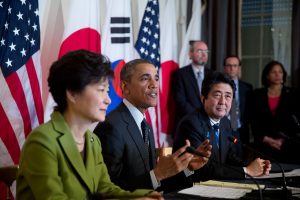The U.S. rebalance to Asia has been productive, in some aspects at least. For example, the U.S. and Japan have reaffirmed their strategic ties regarding regional and global issues, which obviously frays China’s nerves. But perhaps the U.S. stance has not been completely “balanced,” especially when it comes to South Korea-Japan relations. The controversial attitudes and behaviors, particularly regarding historical issues, by the United States’ key ally Japan have constantly annoyed not only the Chinese, but also the South Korean government and general public.
China intends to build a “new type of great power relations” with the U.S. but has not found Washington very enthusiastic about that proposal. So China has not wasted the strategic space it can claim from the discord and friction between its two neighbors. China has virtually turned South Korea-Japan relations into America’s Achilles’ heel even as the U.S. strategically turns toward this region, intending to assure other states of its firm stance. On a bilateral level, China’s goodwill gestures and charm offensive toward South Korea seems to have worked to a certain degree. The latest U.S.-China Economic and Security Review Commission (USCC) report claimed, “As its influence over South Korea grows, China judges it eventually will be in a stronger position to pressure South Korea to reduce its security ties with the United States.”
Meanwhile, the U.S. has good reasons to worry about South Korea-Japan discord. From the U.S. perspective, it is not difficult to imagine how different the regional situation could be if South Korea were to significantly improve its relationship with Japan. This would help to stabilize the U.S. presence in Northeast Asia. In fact, poll data shows that 57.8 percent of Koreans support President Park Geun-hye taking a proactive role in improving relations with Japan. Despite this, the chilliness in South Korea-Japan relations endures.
The fact is that historical empathy with China has indeed played a role in South Korea’s alienation contemporary from Japan. The U.S. finds itself in a somewhat awkward situation: the U.S., China, and South Korea were the victorious allies against Japan in WWII. But the U.S. believes that Japan has successfully and peacefully transformed into a key ally in East Asia, and also believes that Japan deserves trust and even the “normal status” that it has long sought. However, China and South Korea have real concerns based on their own perceptions, though attitudes toward Japan in these two countries may differ depending on the case. Nevertheless, this divergence has yet to be overcome, and it has at least partially contributed to China’s counter-measures in its efforts to hedge against the U.S. “rebalance.”
The situation is like a multi-level East Asian Go tournament. The players are not only China and the U.S., but also other states like South Korea and Japan. China believes that it may take advantage of strategic and tactical differences among the other three players to maximize its gains at the weakest point in the board.
U.S. President Barack Obama has shown a certain degree of flexibility regarding his policies toward China, as shown by the relatively few but still notable agreements reached with his Chinese counterpart President Xi Jinping over some significant bilateral and regional issues. But the Obama administration has only two more years in office. No matter which candidate takes a seat in the Oval Office after 2016, China cannot be sure whether the White House will take a different (or stronger) stance towards China or not. Further, Washington might find a way to seriously deal with its “Achilles’ heel” in the region. With some of the key players about to change, 2015 could be an important transitional period for a possible regional reshuffle in East Asia.
































